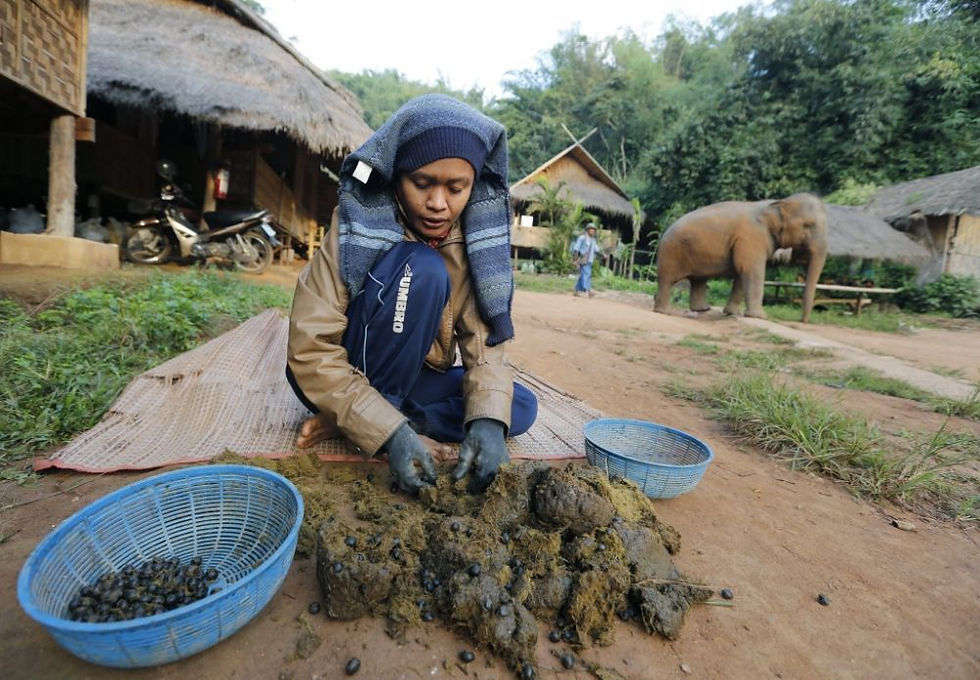Coffee continues to be one of the most consumed beverages globally. Currently, it is estimated that around 166.5 million bags of coffee are consumed every year.
Consumers are seeking unique and high-quality coffee flavors. And the continuously evolving coffee brewing methods offer diverse and personalized coffee experiences.
Moreover, there are many kinds of coffees to meet the high demand for various flavors. For example, Black Ivory and Kopi Luwak are the most expensive and also the most interesting ones!
Black Ivory: World’s rarest and the most expensive coffee
- It is simply obtained from elephants’ waste!

In Thailand, 20 elephants are specially fed with Arabica coffee beans that have been picked from an altitude of 1500 meters. Their digestive enzymes break down the proteins of the cherries, the fruit that surrounds the coffee bean, and that gives the taste of the coffee.

Note: They mix the beans with elephants' favorite foods to ensure that the elephants enjoy their food. The food recipes are prepared specifically for each animal since every elephant has different taste buds, just like a human!


They digest the coffee for 12 to 72 hours. After that, the elephant caregivers collect and send them to be washed and dried until a certain amount of moisture is left. Eventually, there is a mechanical process to be hulled and sorted.

Did You Know ?!
33 kilograms of beans are used to obtain 1kg of Black Ivory coffee.
1 kg of Black Ivory coffee is sold to 3,000$
- The idea came from a Canadian entrepreneur :
Kopi Luwak (coffee) had turned out to be a problem due to counterfeiting, disease, and animal abuse. But this method would be definitely better than the Kopi Luwak. Furthermore, veterinary tests reported that elephants do not absorb any caffeine from eating raw coffee cherries.
"They (elephants) eat a lot of grass and green, leafy matter. A herbivore, to break that down, utilizes fermentation to break down that cellulose," he says. "Fermentation is great for things like wine, beer, or coffee, because it brings out the sugar in the bean, and it helps impart the fruit from the coffee pulp into the bean."
If you wonder about its taste: "I want people to taste the bean, not just the roast," he says. "The aroma is floral and chocolate; the taste is chocolate malt with a bit of cherry; there's no bitterness; and it's very soft, like tea. So it's kind of like a cross between coffee and tea."

Kopi Luwak Coffee
It is a method of producing, that the coffee is obtained from the mess of the cat, from palm civet. Often called “cat poop coffee”

As the same Black Ivory palm civets are fed, the flavor of the coffee is improved by passing through the palm civet’s digestive system.

There, an enzymatic process occurs in the stomach where acids interact with the beans, making them smoother and less acidic.
Being smooth and less acidic is actually an advantage for the taste of coffee however some critics claim that it is simply bad coffee, purchased for novelty rather than taste.
Did You Know ?!
The average cost of 1 kg of Kopi Luwak Coffee is 500$
Civet Farms! 〰and the animal abuse...
At first, the civet coffee boded well for palm civets since the local people protected civets for their valuable role in trade. But then, coffee gained popularity and became the center of tourist attraction in Indonesia. Due to the financial interest of the market of this coffee, producers have captured these animals and locked them in cages.

An article about the health of palm civets reports that researchers from Oxford University and World Animal Protection investigated the living conditions of 50 wild civets held in cages at 16 plantations.
Unfortunately, every plantation failed the basic animal welfare requirements. Some of the civets were very thin because of the restricted diet of only coffee cherries, some were obese due to not being able to move freely.
Moreover, many of them had no access to clean water and were exposed to the noise of traffic and tourists.
Today, many organizations refuse to certify against the capture of palm civets.
Coffee is a huge industry all by itself. Thus, hundreds of various coffee-producing methods are developed and still being searched by the coffee experts of companies such as Black Ivory and Kopi Luwak!
References:
https://www.usatoday.com/story/tech/sciencefair/2012/12/07/coffee-elephants-dung/1753385/
https://steemit.com/nature/@mohsin27/kopi-luwak-the-most-expensive-coffee-in-the-world
https://www.nationalgeographic.com/animals/article/160429-kopi-luwak-captive-civet-coffee-Indonesia
https://steemit.com/nature/@mohsin27/kopi-luwak-the-most-expensive-coffee-in-the-world
https://indotravelteam.com/blog/the-imposture-of-kopi-luwak-the-most-expensive-coffee-in-the-world/
https://www.npr.org/sections/thesalt/2012/09/20/161478954/heres-the-scoop-on-cat-poop-coffee
